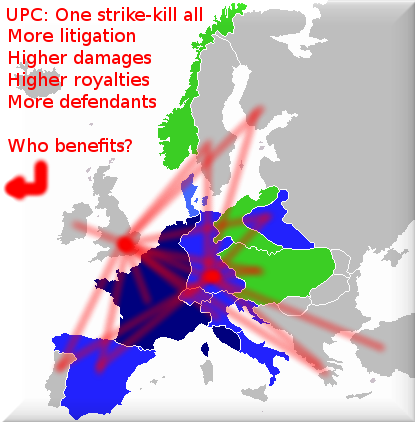

IT IS not only the EPO's management that's pushing hard for UPC; many patent lawyers do the same, regardless of what the European public thinks about it. The public hardly even knows about it because there's no effort to inform the public. This is why we made it a priority.
"The public hardly even knows about it because there's no effort to inform the public."Proponents of UPC just keep renaming it, making it harder to keep abreast of. Well, how many names has it got now? Half a dozen so far and now there are at least three. Dodging negative publicity? Uncertain about what the heck they're doing behind closed doors? Deficient communication? Too many different languages that basically make the UPC impractical and far-fetched? According to this UPC booster: "Of most interest to the AmeriKat, of course, were Sir Robin's chapters in Part IV on the patent system and, in particular the Unified Patent Court."
Well, AmeriKat works for a company that's looking to profit from the UPC. AmeriKat basically spent years promoting software patents and now bats for the Establishment by spending a lot of her time treating the UPC as though it's inevitable (the same tactics which Clinton proponents use at the moment, misleading those who follow the media). MIP, as of today, speaks to "Alice O’Donkor about her role in creating the Unitary Patent and UPC" (nothing to be proud of, as it's inherently antidemocratic).
To quote the relevant part:
Despite many obstacles along the way, this work culminated in a 2013 agreement between most EU member states to set up a Unitary Patent and Unified Patent Court. The agreement ended decades of deadlock since a single EU patent system was first proposed. It is now expected to come into effect early next year.
“We had to be extremely creative to overcome all types of legal and political difficulties and to find solutions to seemingly unsurmountable problems. That is something that was hard at times, but also very enjoyable,” said Fröhlinger.
She also paid tribute to the “enthusiasm and commitment” to a European project at a time when, in many people’s eyes, the EU does not seem to be moving forward.
One lesson she learned, she said, was not to dwell on difficulties: “You should just think of getting things done and that is amazing what you can do if you are not looking for credit – if you are just trying to get things done.”
Since leaving the European Commission, Fröhlinger has been working at the EPO helping to set up the procedures for the Unitary Patent, and assisting the UPC Preparatory Committee. There is still much work to do before it is ready, she says: “The Unitary Patent is ready; we are trying very hard to help to bring the Unified Patent Court to life.”
"This whole UPC campaign isn't obeying law or democracy; it's stomping on both and makes complete mockery of the very notion of democracy (the public was never asked about it, doesn't participate in the process and so on)."Asking lawyers in Germany (or Mayer Brown International LLP) about the prospects of UPC is like asking a weapons manufacturer about the prospect of future wars (to which they contribute of course). This whole UPC campaign isn't obeying law or democracy; it's stomping on both and makes complete mockery of the very notion of democracy (the public was never asked about it, doesn't participate in the process and so on). Here in today's British media we see alarmists stating that Brexit would jeoparadise the UPC (even though UPC and EPO are not a EU thing). To quote: "For the European Patent Office (EPO), the body that grants patents, the potential for a Brexit has come at a particularly inconvenient time after several years of efforts to ratify the new unitary patent scheme in Europe.
"The unitary patent is set to be granted by the EPO and will be valid in 26 countries, with a centralised court of enforcement known as the Unified Patent Court (UPC). It was conceived as a way to cut down on the cost, administration and red-tape of filing and enforcing a patent across many European jurisdictions. Under the unitary system, those seeking patent protection in multiple markets can file a single application to the EPO, and if granted, see it have immediate effect across all relevant states and pay a single renewal fee."
"The UPC would be an absolute disaster for Europe, for the benefit of few very rich Europeans and also some very rich foreigners or patent trolls."This description of the UPC is highly misleading. It's almost as though someone from Bristows LLP sent a memo to The Guardian, which did no subsequent fact-checking. The UPC would be an absolute disaster for Europe, for the benefit of few very rich Europeans and also some very rich foreigners or patent trolls. It is disappointing to see the media failing to point this out, instead believing words like "community", "union", "unitary", and "unity" (in reality, further separating the super-rich from everybody else in the economic sense). This also opens the door to software patents in Europe. ⬆